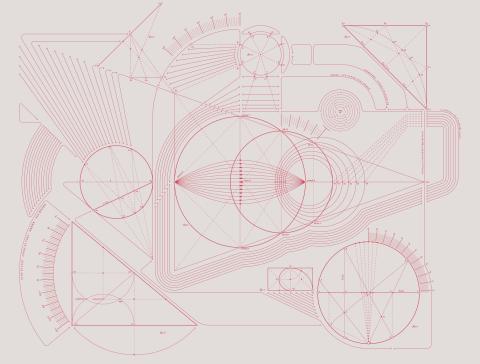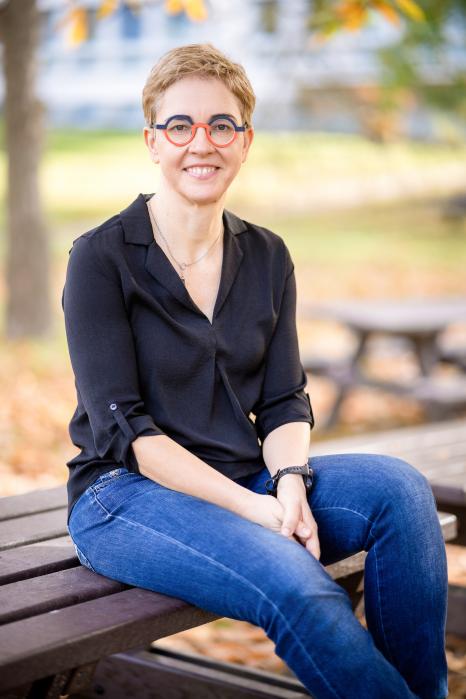
Ana-Maria Castravet: delving into the heart of algebraic geometry
Ana-Maria Castravet is a professor of mathematics at Université de Versailles Saint-Quentin-en-Yvelines (UVSQ), a member of the Mathematics Laboratory of Versailles (LMV - Univ. Paris-Saclay/French National Centre for Scientific Research, CNRS/UVSQ) and a senior member of the Institut Universitaire de France (IUF). A specialist in algebraic geometry, she investigates the complexity of algebraic varieties and moduli spaces. A dedicated teacher, she champions a vision of mathematics driven predominantly by creativity and where women have a vital role to play.
Originally from Romania, Ana-Maria Castravet grew up in an environment that stimulated her interest in mathematics. From secondary school onwards, she took part in many national competitions and discovered the joy of problem-solving. However, it wasn't until her undergraduate studies at the University of Bucharest (1993-1997) that, in her words, she "fell madly in love" with the discipline. "Until then, I'd seen mathematics as little more than a collection of tricks; but at that time, I discovered an unsuspected conceptual depth."
She decided to cross the Atlantic to join the Massachusetts Institute of Technology (MIT), where she defended her thesis in 2002, in an environment she describes as a "paradise for science, where openness and sharing fuel creativity". This was followed by an extensive postdoctoral career in the United States, notably at Princeton and the University of Texas in Austin, marked by successful collaborations and scientific discoveries. She then secured permanent positions at the University of Arizona, Ohio University and Northeastern University in Boston. In 2018, a new chapter began in France with her appointment as a professor at Université de Versailles Saint-Quentin-en-Yvelines (UVSQ) and her integration into the Mathematics Laboratory of Versailles (LMV).
Exploring the complexity of moduli spaces and Fano varieties
Ana-Maria Castravet is a specialist in algebraic geometry, a branch of pure mathematics that studies algebraic varieties, i.e. geometric objects defined by systems of polynomial equations. Lines, circles or parabolas studied at secondary school provide the simplest examples, but contemporary research, in which Ana-Maria Castravet is engaged, focuses on much richer, more complex structures. Her work is therefore structured across two main areas. "The first part of my research explores moduli spaces, those special varieties that are used to classify large families of geometric objects. Behind what may seem like a simple idea - for example, the space of all lines in our three-dimensional space - lie structures of remarkable subtlety," explains the lecturer. Her research, conducted in partnership with her American colleague Jenia Tevelev has revealed the extent to which these spaces conceal an unexpected complexity.
A second major focus of her research concerns the study of so-called "higher" Fano varieties, another class of algebraic varieties, the description of which is anything but straightforward. "On this project, I'm working with Carolina Araujo, a Brazilian mathematician, and a group of female researchers across four continents," notes Ana-Maria Castravet. Initiated during the COVID-19 pandemic at an international women's workshop, this network has since been developed with regular meetings in the United States, Europe, Paris and soon once again in the French capital, demonstrating the vitality and collaborative nature of this field of research.
When teaching fuels research
A dedicated Professor, Ana-Maria Castravet believes that research and teaching are mutually enriching. "Good teaching is also a great way to learn how to present your research more effectively," she likes to point out. Since joining UVSQ, she has been involved at every level: undergraduate courses, master's supervision and directing doctoral theses. She also highlights the quality of French students, whom she considers "very good" compared with the average level of students in the United States.
Alongside her teaching, Ana-Maria Castravet has taken on a wide range of institutional responsibilities. Between 2018 and 2025, she directed the 1st year Master’s degree in applied algebra, served as deputy director of the Jacques Hadamard doctoral school, coordinated a scholarship programme promoting scientific collaboration between France and Brazil, and played an active role in a project funded by the French National Research Agency (ANR) designed to strengthen connections among researchers in France working on Fano varieties and related subjects.
Creativity as the driving force of mathematics
For Ana-Maria Castravet, mathematics is not merely a universal language working for science, "It's an expression of human creativity, just like painting or music." And while the results of her research in pure mathematics resonate in applied fields such as cryptography, computer security and theoretical physics, what ultimately drives the mathematician - beyond such "usefulness" - is the conceptual beauty of the objects she studies and the creative freedom they offer. For Ana-Maria Castravet, a mathematician is not the often-imagined isolated figure, shut away with paper and pencil. "Of course, solitary concentration is necessary. But mathematical life is deeply nourished by human collaboration. Behind many projects there is, first of all, a meeting, a friendship, a human connection. You meet someone at a conference, exchange an idea, then one thing leads to another, and a research project takes shape."
Inclusion working for creativity
This collective dimension also underpins her commitment to improving the representation of women in mathematics. While she observes greater openness among younger generations, she still notes breaks in their career paths: "At undergraduate and master's level, the balance between male and female students is fairly even. But at the PhD level, we begin to lose women," she laments. Inspired by the women's research workshops she experienced in the United States, she advocates for similar schemes to be set up in Europe: "These dedicated workspaces allow women to feel legitimate, to strengthen their network and, above all, to build the confidence they need to assert themselves in a field still largely dominated by men. I'm convinced that diversity fosters mathematical creativity."
Towards new collective adventures
Ana-Maria Castravet's appointment to the Institut Universitaire de France (IUF) in 2024 marks a milestone in her career. This recognition provides her with the time and resources to explore new directions. Among her priorities are the organisation of workshops for women in mathematics in France and across Europe, as well as strengthening her international collaborations. Curious about contemporary transformations, she is also interested in the potential contributions of artificial intelligence: "I'm not a specialist, but I'm fascinated by the way these tools open up new perspectives and force us to rethink how we ask certain questions," she explains. Through these projects, Ana-Maria Castravet continues to pursue a constant ambition: to make mathematics an intellectual and collective adventure, where creativity is nourished as much by ideas as by human encounters.

